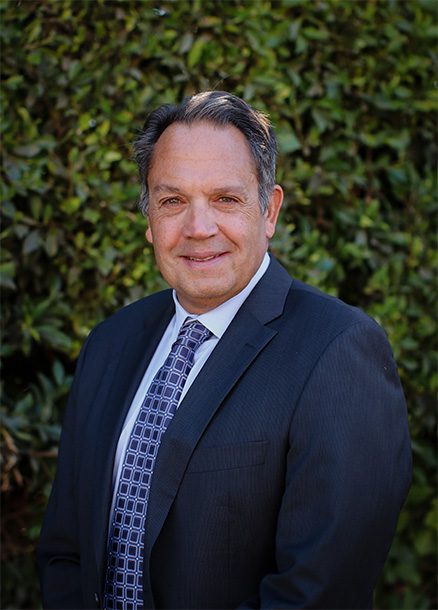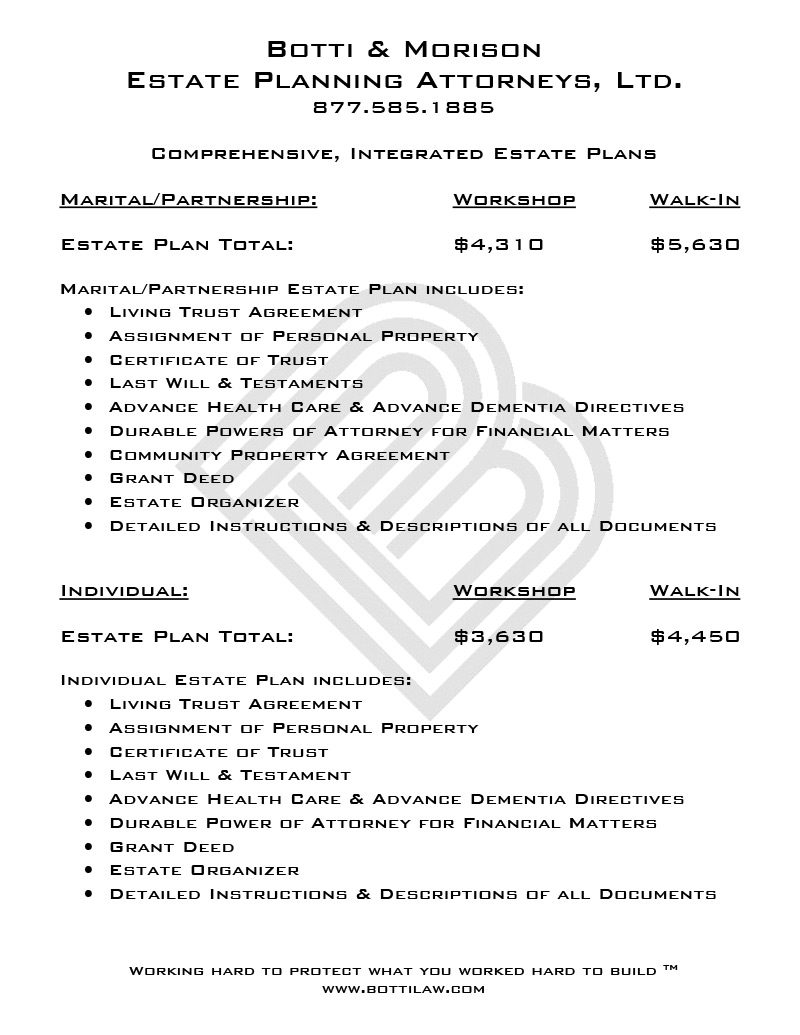We Provide a Full Range of Estate Planning, Probate & Elder Law Services
It is important to seek qualified professional advice when considering any of these services so that they will withstand IRS scrutiny while accomplishing your objectives. If you are thinking about estate planning services, please contact us (877) 585-1885 or by email to schedule a free no-obligation consultation with one of our attorneys — or attend our free workshop — we will answer all your estate planning questions.
Our Services
Estate Planning
FOR INDIVIDUALS, MARRIED COUPLES AND DOMESTIC PARTNERS
This plan includes:
- Declaration of Trust
- Certificate of Trustee Authority
- Wills (2)
- Advance Health Care Directive (2)
- Durable Powers of Attorney (2)
- Community Property Agreement
- Grant Deed
- Comprehensive Transfer Document
- Estate Organizer
- Detailed Instructions
This document allows you to designate an agent to manage your financial affairs should you become unable to manage them yourself.
Irrevocable Life Insurance Trusts
An advanced estate planning vehicle intended to transfer substantial proceeds from a life insurance policy to the trustor’s beneficiaries free from federal estate taxes.
Qualified Personal Residence Trusts
This is a special type of trust designed to remove the value of the trustor’s primary residence or a second home from their taxable estate.
Family Limited Partnership (FLP) / Limited Liability Company
Family Limited Partnerships and Limited Liability Companies are common estate planning tools that provide added creditor protection and reduce taxes on the overall estate.
Charitable Remainder Trusts
A type of specialized trust for those who wish to give to charitable or philanthropic organizations once they pass. It also generates lifetime income for specified beneficiaries and immediate tax benefits.
Irrevocable Trusts
The purpose of this tool is to effectively transfer ownership and complete control of all properties within the trust to the specified beneficiaries. An irrevocable trust cannot be changed or terminated unless the trustees, trustor, and named beneficiaries unanimously agree. It provides added protection from creditors and can put a person in the position to qualify for Medi-Cal benefits by allowing them to transfer non-exempt assets to the trust.
Special Needs Trusts (both 3rd party and 1st party)
A type of special trust that holds title to property for the benefit of a child or adult with a disability without interfering with their eligibility for public benefits.
IRA Inheritance Trusts
Allows the account holder to transfer their IRA funds to the right beneficiaries upon death and permits beneficiaries to “stretch out” their taxable, required minimum distribution over their own life expectancies.
Crummey Trusts
With a Crummey Trust established, the trustor can pass assets free of both gift and estate taxes to specified beneficiaries. The trust also retains the option to place limitations on when the beneficiary can access money or property.
Intentionally Grantor Defective Trusts (IGDTs) for Asset Protection, Estate Tax Avoidance and Medi-Cal Planning
IGDTs can be incredibly useful to a person’s estate plan as it allows beneficiaries to inherit property at its market value at the time of the decedent’s death. The beneficiary does not have to pay estate taxes or taxes on any income the property may have generated while held in the trust.
Generation Skipping Trusts (Dynasty Trusts)
A long-term trust created with a sizeable amount of assets designed to benefit future generations of the decadent’s family. These types of trusts offer superior asset protection, will have no affect on government benefits, and will not be subject to estate taxes.
Grantor Retained Trusts
A type of irrevocable trust developed for the purpose of reducing estate, gift, and generation-skipping transfer taxes. With this trust, the grantor can receive back an annuity payment each year and the amount given is structured so the transfer produces little or no gift tax.
Installment Sales
The sale of a property where at least one payment is to be received after the close of the tax year in which the sale occurs. Instead of receiving the proceeds at the time of the sale, the seller will receive a series of payments over several years.
Self-Canceling Installment Notes (SCINs)
The “self-cancelling” feature of SCINs means if the original buyer dies during the term of the note, then the “buyers” (typically their loved ones) will not be obligated to provide further payments. They will also receive the entire asset free of any transfer taxes.
Private Annuities
In a private annuity transaction, the annuitant transfers property to an obligor in exchange for annuity payments. This is often used to transfer assets to a family member without being subject to gift or estate taxes.
Already have an estate plan and would like your documents reviewed by an attorney? Please contact us via email or call us at (877) 585-1885 and our office will arrange for a consultation with one of our attorneys. We will ask you complete the appropriate questionnaire prior to your appointment.
Administration
If you are a beneficiary of a person’s estate and been told by a financial institution that you need “letters testamentary” before you can access an account or told by a real estate agent that you need court approval before a piece of real estate can be sold, then you are facing a probate proceeding. Probate allows the estate of the deceased individual to be distributed to the beneficiaries or rightful heirs. The distribution will follow the decedent’s Will or if no Will exists, then distribution will follow the California “intestate” laws. Probate serves as a way to transfer assets, resolve debts and clear title so the decedent’s assets can be transferred to their rightful heirs. It is a complicated and time-consuming process. Whatever your circumstances, we will provide you with legal guidance and assistance in determining the best method of handling your probate matter.
Have you or a family member been designated as the successor trustee of a living trust?
If the person who created the trust (the “trustor”) is still alive, it’s not too early to attempt to understand what responsibilities that designation brings, and to educate yourself as to how the trustor can make your eventual task as simple as possible.
If the trustor has passed away and you are facing the reality of “administering” the trust, you absolutely need guidance. The fiduciary obligation that is imposed upon successor trustees carries significant weight in our legal system, and one must be vigilant to avoid breaching that duty. This is not to say that the designation of a successor trustee necessarily imposes a tremendous burden on the designee, but the path to a smooth administration of a trust is riddled with potential pitfalls, and it is reassuring to have experienced counsel to assist in the process.
The experts at Botti & Morison Estate Planning Attorneys have provided assistance to countless successor trustees, and are available to assist you, family members or friends who may be facing the task of carrying out an estate plan. The amount of assistance is up to you – clearly, some trusts (and some trustees) require more help than others – we are ready to help with whatever level of guidance your situation warrants.
We’ve all heard the stories of families fighting over the estate of a deceased relative. Unfortunately, sometimes these battles are unavoidable (regardless of how well one tries to head them off in advance through effective planning). Most often, they result from a poorly-crafted estate plan (or, obviously, a failure to plan at all).
No one likes these types of contests, since they often cause irreparable harm to a family, so the attorneys at Botti & Morison are predisposed to attempt to work to bring family members to a mutually-acceptable solution through artful negotiation. If, however, a lawsuit over a will or a trust erupts, our attorneys have the experience and ability to work with you to zealously represent your interests.
If you believe that the estate of a loved one is headed for a battle, don’t wait, contact us right away – the longer you wait, the more unlikely it is that an amicable settlement may be reached.
Conservatorship is a judicial process by which a probate court judge appoints a responsible person to serve as the conservator of another adult. Just about anyone, including the proposed conservatee, can file a petition for conservatorship. Conservators are appointed according to priority as follows:
- Spouse
- Adult Child
- Parent
- Sibling
- Any other interested person
- Public guardian
If the person with highest priority declines to act, he or she can nominate another. If all qualified family members and friends refuse to serve, the court will likely appoint a private professional fiduciary. All conservators are entitled to reasonable fees for their services and are paid from the conservator’s estate. Fees are paid, however, only after fee statements have been reviewed and approved by the probate court judge.
The scope of a conservator’s power is separated into two parts, the “person” and the “estate.” Power over the “person” includes authority to make decisions regarding day to day activities, such as where a conservatee lives, what they do, how they do it and who they visit. Power over the “estate” includes authority to make decisions about the conservatee’s assets, such as managing rental property, collecting income, paying bills and investing. The scope of a conservator’s powers may include both the “person” and “estate” or may be limited to one or the other.
Before appointing a conservator, a probate judge must find that the proposed conservatee lacks the ability to provide for self-care and protection. It takes approximately six weeks from the day a petition is filed with the probate court before an appointment may be made. It could take longer if there is opposition. In rare cases of extreme urgency, a temporary conservator may be appointed within a couple of days.
Limited conservatorships are similar to regular conservatorships, except they are used for developmentally disabled people (A conservatee is usually autistic or has an IQ of less than 70). Conservators in limited conservatorships have limited authority because most developmentally disabled people are capable of making some decisions.
LPS conservatorships are reserved for people who are seriously mentally ill and require special care and treatment. LPS conservatees are typically confined to locked facilities or administered very powerful medicine to control their behavior. LPS conservatorships are not appropriate for people suffering from dementia; they should be conserved under a regular conservatorship proceeding.
Conservatees typically share some of the following characteristics: they can no longer effectively perform daily tasks such as shop for food, make meals, bathe, dress themselves, clean the house, drive a vehicle, protect and defend themselves, keep accurate records, account for their money or pay bills. They are often lonely, isolated and withdrawn. They are therefore deemed susceptible to fraud and scams.
Knowing when to seek a conservatorship can be difficult. The “right time” is not always obvious, as a potential conservatee may appear lucid one day and confused the next. One must balance the proposed conservatee’s desire for independence with the need for safety. Conservatees may voice opposition to “losing their freedom” and the process can be somewhat complicated. So when it’s time to consider conserving a loved one, we can provide the advice and counsel needed.
Guardianship is a court proceeding in which a probate judge gives someone who is not the parent:
1.) Custody of a child, or
2.) The power to manage the child’s property (called an “estate”), or both.
To get appointed as a guardian one must fill out and file forms with the local Probate Clerk. Afterwards a Court investigator will interview the applicant and the child. If the child’s parents are alive and available, the investigator may interview them as well. The investigator will make a recommendation to the judge and if there are no objections to the appointment and, after reviewing the case, the judge finds the appointment is in the child’s best interest, one will likely be appointed as its guardian. We handle all guardianship matters from simple uncontested matters ,to complex highly-contested international matters.
Wills
FOR INDIVIDUALS, MARRIED COUPLES AND DOMESTIC PARTNERS.
This plan includes:
- Wills (one for each person)
- Advance Health Care Directive (one for each person)
- Durable Power of Attorney (one for each person)
Elder Law
Medicare is a federal insurance program paid out of Social Security deductions. All persons over 65 who have made Social Security contributions are entitled to the benefits, as well as disabled workers who have been eligible for Social Security disability benefits for at least two years. Medicare is not based on financial need. Anyone who meets the age, disability and/or coverage requirements is eligible.
Medicare does not pay for all medical expenses, and usually must be supplemented with private insurance (“medigap”) or consumers can enroll in an HMO plan that contracts with Medicare. After 3 days of prior hospitalization, Medicare will pay up to 100% for the first 20 days of skilled nursing care. For the 21 to 100 days, the patient will pay a co-payment. The premiums and copayments are increased every year. There will be no Medicare coverage for nursing home care beyond 100 days in any single benefit period. It should be noted that Medicare only pays for “skilled nursing care,” does not pay for “custodial care” and the average stay under Medicare is usually less than 24 days. Thus, few can look to Medicare to pay for any substantial nursing home costs.
Medi-Cal is a combined federal and California program designed to help pay for medical care for low-income persons. Although Medi-Cal recipients may receive Medicare, the Medi-Cal program is not related to the Medicare program. Medi-Cal is a need-based program and is funded jointly with state and federal Medicaid funds.
SSI and other categorically-related recipients are automatically eligible. Others, whose income would make them ineligible for public benefits, may also qualify as “medically needy” if their income and resources are within the Medi-Cal limits.
California sets a “maintenance need standard”. Since January 1, 1990 the maintenance need standard for a single elderly/disabled person in the community has been $600 monthly; the Long Term Care maintenance need level (i.e., personal needs allowance when someone is in a nursing home) remains at $35 monthly for each person. Individuals whose net monthly income is higher than the state payment rate may qualify for the program if they pay or agree to pay a portion of their income on monthly medical costs. This is called the “share of cost.” Individuals eligible with a share of cost must pay or take responsibility for a portion of their medical bills each month before they receive coverage. Medi-Cal then pays the remainder, provided the services are covered by the program. This works much like an insurance deductible. The amount of the share of cost is equal to the difference between the “maintenance need standard” and the individual’s net non-exempt monthly income.
Medi-Cal pays for health care services which meet the definition of “medically necessary.” Services include: some prescriptions (although the Medicare Part D program now covers most prescriptions), physician visits, adult day health service, some dental care, ambulance services, some home health, X-ray and laboratory costs, orthopedic devices, eyeglasses, hearing aids, some medical equipment, etc. All covered services, or the remaining costs over the share of cost of nursing home care, will be covered if the individual meets income/resource requirements. Some services such as home health care, durable medical equipment, and some drugs require prior authorization.
Nursing home care is covered if there is prior authorization from the physician/health care provider. Residents are admitted on a doctor’s order and their stay must be “medically necessary”. Residents are allowed to keep $35 of their income as a personal needs allowance. Residents with no income may apply for the Supplemental Security Income/State Supplemental Program (SSI/ SSP), and, if eligible, they will receive a payment of $50 as a personal needs allowance.
To qualify for Medi-Cal the recipient must demonstrate that they have limited resources available. Medi-Cal classifies property as “exempt” and “non-exempt.” Exempt property is not counted in determining eligibility; non-exempt property is counted. One’s home is considered exempt; this presents unique and profound planning opportunities.
A “Community” (at home) spouse may retain up to $109,560 in liquid assets, not including the home and other exempt assets, such as IRAs and retirement funds. Any assets above the property reserve limit of $2,000 or $109,560, in the case of a community spouse, or any asset that is not exempt will be counted by Medi-Cal in determining eligibility. These numbers adjust on a yearly basis.
Medi-Cal applicants, beneficiaries and their spouses should always be aware of the Medi-Cal Recovery rules and plan ahead by consulting a qualified professional if they want to avoid recovery on their home or other assets. Our services include both assisting individuals in qualifying for Medi-Cal as well as protecting their estates from state recovery efforts.
What Should You Expect?
The first step in the planning process is to Request a Consultation with one of the attorneys in our office. If, after your initial consultation, it is determined that Medi-Cal is a viable planning option for you, then we will gather information about your personal care needs, monthly expenses, your goals regarding long term care, and your financial resources. We will discuss the benefits that might be available to you if you qualify, the application process, and what role we would play in that process.
We will discuss fees with you in advance. Once the assessment is completed, we will make a recommendation to you about whether you might qualify for Medi-Cal benefits, and you will have the information you need to decide whether you would like to file an application for benefits.
If you are a wartime veteran or the spouse of a wartime veteran, you may be entitled to receive a monthly cash payment to offset the burden of nursing home, assisted living, or in-home care costs. The monthly cash payment available from the Veteran’s Administration is paid through the Aid and Attendance Program and is referred to as a monthly “pension.” If you are a veteran and you qualify, you are entitled to receive a monthly cash payment of $1,644 (2010). If you have a spouse, you will receive an additional amount each month. If you are the surviving spouse of a wartime veteran and you qualify, you are entitled to receive a monthly cash payment of $1,056 (2010).
To qualify for benefits, you must present medical records showing you meet the medical eligibility requirements. You must also show you have limited income and assets. The Veteran’s Administration will also take a close look at your financial assets, including bank accounts, brokerage accounts, life insurance, annuities, and retirement accounts.
What Should You Expect?
The first step in the planning process is to Request a Consultation with one of the attorneys in our office. If after your initial consultation it is determined that Veteran’s Administration Planning is a viable option for you, then we will gather information about your personal care needs, monthly expenses, your goals regarding long term care, and your financial resources. We will discuss the benefits that might be available to you if you qualify, the application process, and what role we would play in that process.
We will discuss fees with you in advance. Once the assessment is completed, we will make a recommendation to you about whether you might qualify for Veteran’s Administration benefits, and you will have the information you need to decide whether you would like to file an application for benefits.
Beware of Trust Mills!
Did you purchase a living trust from an organization that you thought was a law firm? Here’s how a “trust mill” works: under the pretext of preparing your estate plan, sales people from these companies obtain your personal financial information in order to use in advancing their hidden agenda: selling inappropriate annuities and other similar investments, most often to senior citizens. According to the California Attorney General:
“To give themselves a cloak of legitimacy, these sales agents pretend to be experts in living trusts. In their solicitations, these sales agents often pose as expert financial or estate planners. They pass themselves off as a “trust advisor,” “senior estate planner” or “paralegal,” and schedule an initial appointment with seniors in their homes. … They sometimes work in assisted living centers, churches and other places where seniors gather, hooking elderly victims through free seminars and other sales presentations. Seniors pay substantial sums of money to sales agents for living trusts, but sometimes, through fraud and deceit, the sales agents damage seniors’ estate plans, and the security of their investments and life savings. … Planning an estate and choosing investments involve important legal, financial and personal decisions. If estate planning documents are not properly prepared or executed they can be invalid and cause lasting damage.”
Does this sound familiar? If so, you should be concerned. You can view the California Attorney General’s full warning concerning Trust Mills. If you have reason to believe that your estate plan was prepared by one of these companies, or if you’re uncertain as to the origin of your documents, you should schedule a free consultation with us.
Workshops
Free 2-Hour Estate Planning Workshop – 4/23/25 AM Camarillo, CA
Wednesday, April 23, 2025
10:00 am - 12:00 pm
Free 2-Hour Estate Planning Workshop – 4/26/25 AM Camarillo, CA
Saturday, April 26, 2025
10:00 am - 12:00 pm
Free 2-Hour Estate Planning Workshop – 4/29/25 PM Camarillo, CA
Tuesday, April 29, 2025
7:00 pm - 9:00 pm
Free 2-Hour Estate Planning Workshop – 5/13/25 AM Valencia, CA
Tuesday, May 13, 2025
10:00 am - 12:00 pm
Newsletter
Sign Up
"*" indicates required fields







